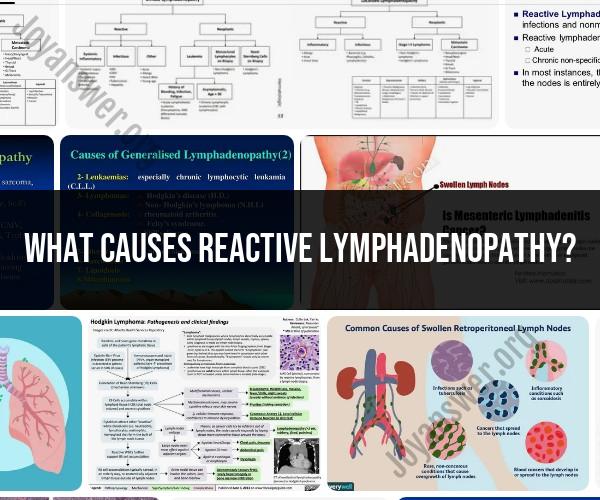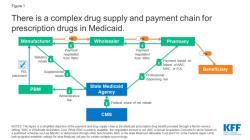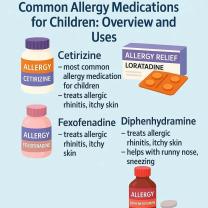What causes reactive lymphadenopathy?
Reactive lymphadenopathy, also known as reactive lymph nodes, refers to the enlargement of lymph nodes in response to an infection, inflammation, or other immune system triggers. These lymph nodes are reacting to the presence of foreign substances or abnormal cells. Several potential causes of reactive lymphadenopathy include:
Infection:
- Bacterial Infections: Lymph nodes can enlarge in response to bacterial infections like strep throat, tuberculosis, or syphilis.
- Viral Infections: Common viral infections such as the flu, colds, or mononucleosis (Epstein-Barr virus) can lead to reactive lymphadenopathy.
- Fungal Infections: Certain fungal infections, such as histoplasmosis or coccidioidomycosis, can trigger lymph node enlargement.
Inflammatory Conditions:
- Autoimmune Diseases: Conditions like lupus, rheumatoid arthritis, and sarcoidosis can cause chronic inflammation, leading to reactive lymph nodes.
- Allergic Reactions: Severe allergic reactions or allergies to certain foods or medications can result in lymph node enlargement.
Skin Conditions:
- Skin Infections: Infections of the skin, such as cellulitis, can lead to reactive lymph nodes in the nearby region.
- Dermatologic Disorders: Skin disorders like eczema or psoriasis can also cause nearby lymph nodes to swell.
Cancer:
- Lymphoma: Certain types of lymphoma, a cancer of the lymphatic system, can cause lymph node enlargement.
- Metastatic Cancer: Cancer that has spread to nearby lymph nodes can trigger reactive lymphadenopathy.
Vaccinations:
- Some vaccines, such as those for hepatitis B or tuberculosis, can lead to temporary lymph node enlargement as part of the body's immune response.
Insect Bites:
- Insect bites or stings can trigger localized inflammation and reactive lymphadenopathy.
Other Factors:
- Injury or Trauma: Physical injury or trauma near a lymph node can cause it to swell.
- Medications: Certain medications, such as phenytoin (Dilantin) or allopurinol, can lead to lymph node enlargement as a side effect.
- Cat Scratch Disease: Caused by a bacterium called Bartonella henselae, this condition can result in enlarged lymph nodes, often after being scratched or bitten by an infected cat.
It's important to note that while reactive lymphadenopathy is typically a benign response to various triggers, persistent or rapidly enlarging lymph nodes should be evaluated by a healthcare professional. In some cases, further testing, such as imaging or biopsy, may be necessary to determine the underlying cause, particularly if there is concern about a more serious condition like cancer.
Reactive Lymphadenopathy: Causes and Considerations
Reactive lymphadenopathy is a condition in which the lymph nodes become enlarged and swollen. Lymph nodes are small, bean-shaped glands that are located throughout the body. They play an important role in the immune system by helping to fight infection and disease.
There are a number of causes of reactive lymphadenopathy, including:
- Infections, such as upper respiratory infections, strep throat, and mononucleosis
- Autoimmune diseases, such as rheumatoid arthritis and lupus
- Cancers, such as lymphoma and leukemia
- Medications, such as some antibiotics and anticonvulsants
- Vaccines
- Injuries
In most cases, reactive lymphadenopathy is not a cause for concern. It is typically a sign that the immune system is working properly to fight off infection or disease. However, it is important to see a doctor if you experience any of the following symptoms:
- Enlarged lymph nodes that are painful or tender
- Lymph nodes that are larger than 2 centimeters in diameter
- Lymph nodes that feel hard or rubbery
- Lymph nodes that are accompanied by other symptoms, such as fever, weight loss, or night sweats
Understanding Lymph Nodes and Their Functions
Lymph nodes are small, bean-shaped glands that are located throughout the body. They are part of the lymphatic system, which is a network of vessels and nodes that helps to remove waste products and fight infection.
Lymph nodes contain a type of white blood cell called a lymphocyte. Lymphocytes play an important role in the immune system by helping to fight infection and disease.
When a person is sick or injured, the lymph nodes in the affected area will become enlarged. This is a sign that the immune system is working to fight off infection or disease.
Infections, Diseases, and Conditions Leading to Lymphadenopathy
A number of infections, diseases, and conditions can lead to lymphadenopathy. Some of the most common causes include:
- Infections: Upper respiratory infections, strep throat, mononucleosis, HIV/AIDS, and tuberculosis
- Autoimmune diseases: Rheumatoid arthritis, lupus, and thyroiditis
- Cancers: Lymphoma, leukemia, and breast cancer
- Medications: Some antibiotics, anticonvulsants, and other medications can cause lymphadenopathy as a side effect
- Vaccines: Some vaccines, such as the measles-mumps-rubella (MMR) vaccine, can cause temporary lymphadenopathy
- Injuries: Injuries to the lymph nodes or lymphatic vessels can also cause lymphadenopathy
Seeking Medical Evaluation and Diagnosis for Lymphadenopathy
If you experience any of the following symptoms, it is important to see a doctor:
- Enlarged lymph nodes that are painful or tender
- Lymph nodes that are larger than 2 centimeters in diameter
- Lymph nodes that feel hard or rubbery
- Lymph nodes that are accompanied by other symptoms, such as fever, weight loss, or night sweats
Your doctor will ask you about your medical history and perform a physical examination. They may also order tests, such as blood tests, imaging tests, or a biopsy, to determine the cause of your lymphadenopathy.
Treatment and Recovery Options for Reactive Lymphadenopathy
The treatment for reactive lymphadenopathy will depend on the underlying cause. If the lymphadenopathy is caused by an infection, your doctor will prescribe antibiotics or other medications to treat the infection. If the lymphadenopathy is caused by an autoimmune disease, your doctor may prescribe medications to suppress the immune system. If the lymphadenopathy is caused by cancer, your doctor will recommend a treatment plan based on the type and stage of the cancer.
In most cases, reactive lymphadenopathy will resolve on its own once the underlying cause is treated. However, if your lymphadenopathy is severe or does not resolve on its own, your doctor may recommend surgery to remove the enlarged lymph nodes.
If you have reactive lymphadenopathy, it is important to follow your doctor's instructions and take any prescribed medications as directed. You should also get plenty of rest and drink plenty of fluids.













